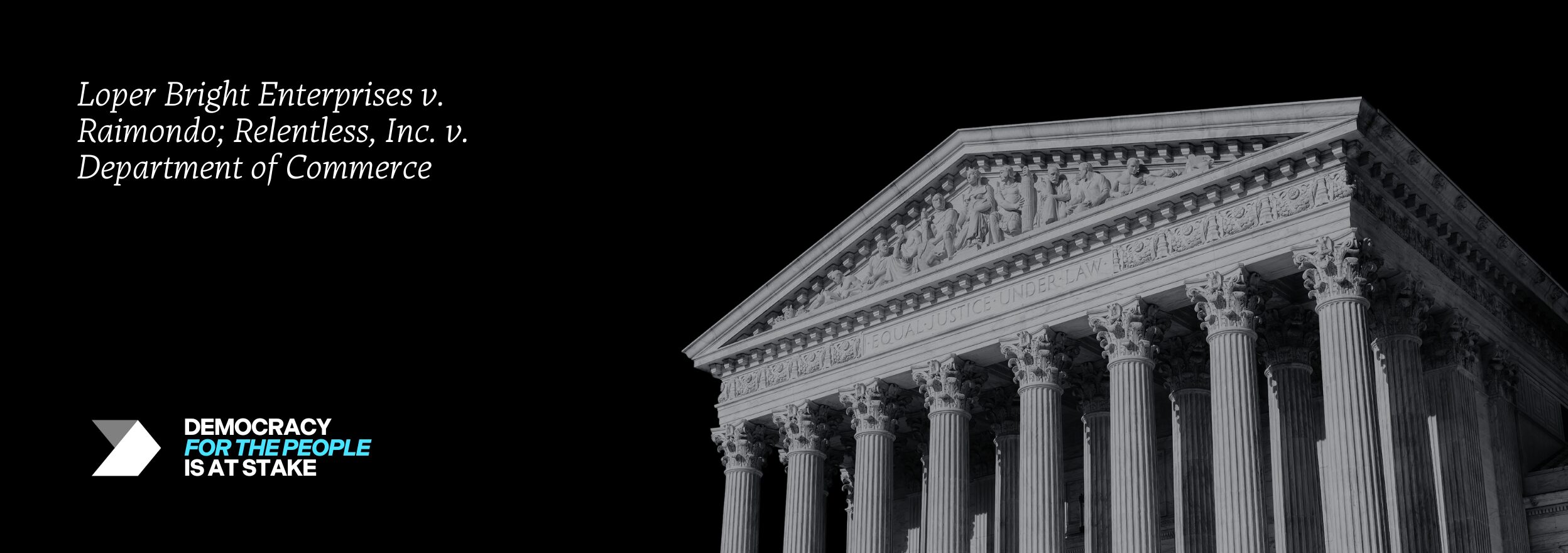
The Loper Bright/Relentless cases concern the relationship between federal agencies, Congress, and the courts. They address a legal doctrine known as Chevron deference which, as articulated in a case in 1984, says that when Congress passes a law that contains ambiguous or unclear language, judges should defer to the expertise of federal agencies in interpreting that language as long as the agency’s interpretation is reasonable.
While Loper Bright/Relentless focuses on one regulation (the National Marine Fisheries Service regulation) that was issued by one particular federal agency, the cases could have far-reaching impact. The legal theories being used to propel these attacks on government’s core functions are misguided and would transform the courts into policy making roles. The Court should not overturn more than 40 years of legal precedent.
WHAT’S AT STAKE
If petitioners successfully convince the court to overturn Chevron, the authority and expertise of all administrative agencies and the thousands of programs and services they run could be at risk. Loper Bright/Relentless could undo the stability of established regulations, from standards on the air we breathe to rules protecting our rights at work, and open up untold numbers of previously settled regulations to new attacks.
Public Health is at Stake
Should the attacks on the government’s ability to serve people through the agencies in Loper Bright/Relentless succeed, all Americans will face the consequences of a less effective government—including potential destabilization of the U.S. Food and Drug Administration’s (FDA) proven process for ensuring the safety and effectiveness of drugs and medical devices. FDA’s regulation of drugs and medical devices is highly technical, relies on scientific expertise, and requires complex policy judgments; all decisions to which judges should continue to defer, not substitute their own non-expert assessments.
Economic Stability is at Stake
While overturning Chevron deference would cause widespread regulatory uncertainty, small businesses would be particularly vulnerable to the drawbacks of an unpredictable regulatory landscape. This effect on small businesses will ripple throughout the American economy. Small businesses are critical to our country’s economy. The vast majority—99.9 percent—of businesses in the United States are small. A chaotic regulatory environment ushered in by the loss of Chevron deference would therefore harm small businesses, the American economy, and American workers.
WHO IS INVOLVED
People Defending Progress:
A broad range of voices and interests support the government’s ability to deliver for people. That includes small business owners we represented in a brief that warns the Supreme Court that upending regulatory certainty would hurt small businesses across the country:
“Overturning this Court’s nearly 40-year precedent as outlined in Chevron, as requested by Petitioners, would create untenable uncertainty for the world of small business. This Court should decline the invitation to do so.”
Additionally, health advocacy groups including the American Cancer Society, the AFL-CIO, environmental advocates, a coalition of scientists including the American Association for the Advancement of Science, and others have weighed in through friend of the court briefs.
In addition to these varied advocacy organizations, Democracy Forward submitted a friend of the court brief in Relentless on behalf of two leading experts in pharmaceutical and regulatory policy which explains that the FDA’s regulation of drugs and medical devices is highly technical, relies on scientific expertise, and requires complex policy judgments; all decisions to which judges should continue to defer, not substitute their own non-expert assessments.
Extremists Attacking Democracy:
A web of far-right legal organizations are seeking to use Loper Bright, Relentless, and other cases to undermine the public’s faith in democratic institutions and subvert the tools the government uses to serve the people.
Notably, Paul Clement, who is counsel of record in the Loper Bright matter, serves on the board of the Bradley Foundation, which is a foundation that has been linked to funding the “Big Lie” and other far-right causes.
The same organizations behind Loper Bright and Relentless have also been active in undermining the right to vote, the right to abortion, the ability of the government to protect consumers, initiatives to advance equity, and perpetuating baseless legal theories that seek to prop up the “Big Lie.”
They also include a number of organizations with ties to Donald Trump and former Trump administration officials have authored multiple amicus briefs in the case. John Eastman—the attorney who advised Trump and orchestrated a scheme to overturn the 2020 election results and has been indicted – submitted a brief in support of the petitioners. America First Legal Foundation — led by President and Executive Director Stephen Miller — and America First Policy Institute — founded by President Trump’s Director of the National Economic Council Larry Kudlow, and led by Trump’s Acting Director of the Domestic Policy Council under President Trump Brooke Collins — both submitted briefs to the Supreme Court in this case.
And, the specific implications for the FDA in these cases are especially stark when one considers the role that groups such as the Alliance for Defending Freedom, which recently put access to the medication abortion drug mifepristone in the balance with its lawsuit challenging FDA’s authority, have weighed in at the Court to urge adoption of the Loper Bright/Relentless petitioners’ arguments.
All told, more than 20 groups or interests associated with the far-right legal movement filed briefs in LoperBright/Relentless, all seeking to overturn a case that is nearly 40 years old—and a principle of law that has been around for a century.